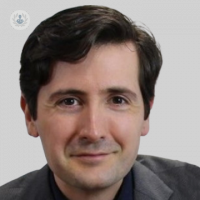Transcranial magnetic stimulation (TMS) in treating OCD
Written in association with:In his latest online article, Dr Aleks George Srbinoski gives us an insight into transcranial magnetic stimulation (TMS). He explains the NICE guidelines for treating OCD, the evidence of treatment of OCD with TMS and if improvement in OCD with TMS is likely to be sustained.

What are the NICE guidelines for treating OCD?
The advice is that every OCD patient should adhere to the NICE treatment guidelines. Psychological treatment should be provided first and this should include CBT with exposure and response prevention (ERP), administered by an experienced therapist. Patients with OCD who are resistant to psychological treatment alone should be offered treatment with an SSRI drug (fluvoxamine, paroxetine, sertraline or citalopram) combined with CBT/ERP. If there has not been an adequate response to a standard dose of an SSRI, then an increased dose should be considered. Clomipramine (a tricyclic antidepressant) should be considered after an adequate trial of at least one SSRI has been ineffective.
A consultant psychiatrist can prescribe other options if this is not effective. This may include adding a drug that treats psychosis to an SSRI or to clomipramine or combining clomipramine with citalopram. An increased dose of clomipramine should be considered if the standard dose has not produced an adequate response. About 40% of OCD patients do not respond well to the above treatment.
How does transcranial magnetic stimulation (TMS) work?
TMS is a pulsating magnetic field which stimulates brain cells and can change the excitability of these cells in the cortex of the brain. Low frequency TMS used in the treatment of OCD decreases cortical excitability and it is not associated with any serious side effects. Some patients may have a short-lived headache or some temporary discomfort over the area where the treatment is applied. If TMS is going to work, a response will be seen within 5 sessions.
What is the evidence for the treatment of OCD with TMS?
A systematic review of the treatment of OCD with TMS was conducted by Zhou in 2017, who reviewed 20 studies with 791 patients. They found that TMS had clinically significant improvements compared to a placebo. Arns reported in 2018 that TMS can lead to remission in about 30% of OCD patients and a clinically significant improvement in 55% who had failed to respond to medication and psychotherapy.
What are the treatment results for TMS?
We have data on a case series of 108 patients who received treatment for OCD at TMS. 60% of these patients had an improvement of at least 20% in their OCD symptoms. Moreover, 30% of patients achieved remission, meaning they no longer met the diagnostic criteria for OCD.
Is improvement in OCD with TMS likely to be sustained?
In 2012, Gomes demonstrated that the TMS improvement lasted for at least 14 weeks. However, no long-term follow-up studies have been published. We have discovered that top-ups every few months can maintain full recovery over the long term.
Circadian sleep disturbance and TMS treatment for OCD:
In 2017, Donse showed that TMS may have a lower response rate for OCD patients who have trouble falling asleep at night and then oversleep in the morning (a disorder of the sleep cycle). We suggest that patients with this problem should talk to their own doctor about treating this condition before starting TMS.
Conclusion and recommendations:
Only after the NICE-recommended treatment has proven ineffective should TMS be considered. Whether to try TMS for patients with OCD who do not respond to the conventional treatment options is a personal choice, based on the information outlined above.
Dr Aleks George Srbinoski is highly respected clinical psychologist with over 15 years of experience in his field. You can schedule an appointment with Dr Srbinoski on his Top Doctor’s profile today.


